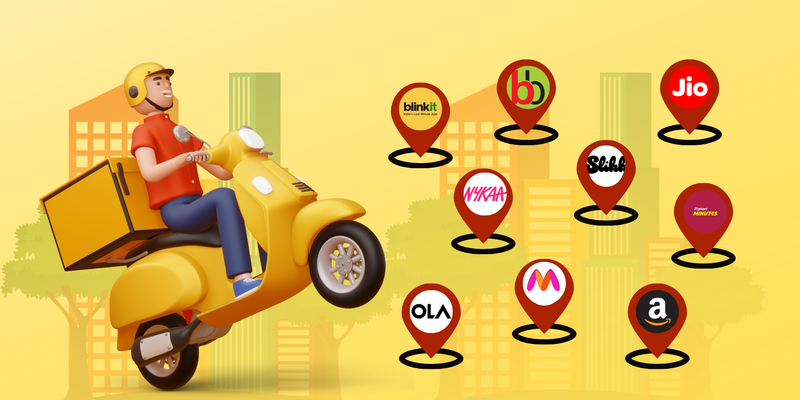Startup
Quick commerce in India: Market leaders & new entrants

Quick commerce is taking centre stage in the Indian market, with the trio of Blinkit, Swiggy Instamart, and Zepto harnessing their early mover advantage. These companies have established strong brand recognition and captured a significant share of the market. In FY24, the combined revenue of these three players exceeded $1 billion, while reports indicate a staggering 280% growth in the quick commerce industry in India over the past two years.
These market leaders are not limiting themselves to grocery deliveries. They are venturing into new categories, including fashion and electronics. The hallmark of quick commerce lies in its promise of rapid delivery—often within just 10 minutes—setting it apart from traditional e-commerce platforms that can take days. Beyond these major players, a wave of startups and tech companies are eager to replicate the success of the incumbents.
Meet India’s new quick commerce brigade
As the quick commerce landscape continues to evolve, here’s a look at some notable players entering the 10-minute delivery space:
1. Amazon India
Amazon is set to roll out its quick commerce vertical in early 2025, despite the competition. The company is bolstering its supply chain through Amazon Fresh, aiming for grocery deliveries within 20 to 30 minutes. Recently, it expanded its grocery delivery service to 130 cities, doubling its reach from last year. Amazon is also enhancing its logistics capabilities by incorporating advanced technologies and optimising delivery routes, ensuring efficiency and reliability. The focus on same-day deliveries for Prime members is expected to play a significant role in attracting customers looking for immediate access to a wide range of products.
2. BBnow
BigBasket, owned by Tata, has transitioned to a full-scale quick commerce platform after successfully piloting 30-minute deliveries. The company plans to deploy 500-600 dark stores nationwide, integrating these with existing warehouses to streamline delivery of both groceries and non-grocery items. BigBasket aims to generate $1 billion from its quick commerce segment this financial year. Additionally, the company is leveraging data analytics to understand consumer preferences, enabling personalised offerings that cater to local tastes. BigBasket’s commitment to quality and fresh products, combined with its strategic partnerships with local suppliers, positions it well in the competitive landscape.
3. FirstClub
Founded by former Cleartrip CEO Ayyappan R, FirstClub seeks to establish a Costco-like experience in India. The startup is currently in talks to raise funds for its quick commerce venture, focusing on delivering curated premium products within 20 to 30 minutes, alongside an offline retail presence. FirstClub’s unique model aims to create a membership-based platform, offering exclusive deals on high-quality products, thereby attracting discerning consumers. The startup is also exploring partnerships with local artisans and brands to provide a diverse product range that emphasises quality over quantity.
4. Flipkart Minutes
Flipkart has recently expanded its “Minutes” service, which promises delivery of various products within 10 minutes. After a successful pilot in Bengaluru, the service is now available in Delhi NCR. Notably, users can cancel or refuse orders if their expectations aren’t met. Flipkart is also investing in advanced AI and machine learning technologies to predict demand patterns and optimise inventory management across its dark stores. The service focuses not only on groceries but also offers a selection of essentials, catering to the needs of urban consumers looking for convenience.
5. JioMart
Reliance Retail’s JioMart is re-entering the quick commerce space with a pilot in Mumbai and Navi Mumbai, promising grocery and FMCG deliveries within an hour. Plans are in place to reduce this time to 30-45 minutes and expand product categories, leveraging Reliance’s extensive network of stores. JioMart is also exploring partnerships with local businesses to enhance product offerings and improve delivery capabilities. The integration of technology, such as real-time tracking and automated inventory systems, aims to streamline operations and enhance customer satisfaction.
6. Myntra
Myntra, owned by Flipkart, has become a pioneer in quick commerce for fashion, offering a four-hour delivery window in select locations. The platform plans to expand its quick delivery services to more cities by the end of 2024. Myntra is focusing on curating fashion items that are in high demand, enabling quicker fulfilment. Additionally, the platform is investing in advanced logistics solutions to ensure timely deliveries and reduce operational costs. Collaborations with brands for exclusive launches and limited-edition collections are also part of Myntra’s strategy to attract fashion-forward consumers.
7. Nykaa
Nykaa has launched a quick delivery pilot in Mumbai, targeting a 10-minute delivery window for select products. However, analysts warn that this ambitious plan could lead to increased fulfilment costs. Nykaa is emphasising the quality of its beauty products and leveraging its existing logistics network to optimise deliveries. The company is also exploring partnerships with local salons and beauty professionals to offer exclusive services, enhancing customer engagement and expanding its product offerings.
8. Ola
Ola is exploring a return to quick commerce, planning to set up automated dark stores to enhance delivery speed. The company aims to utilise its existing infrastructure to streamline the process. Ola’s previous foray into quick commerce under Ola Dash has provided valuable insights that will inform its new strategy. By leveraging its expertise in logistics and technology, Ola is positioned to disrupt the food delivery segment once again, potentially offering unique services like meal subscriptions and event catering in the future.
9. Slikk
Founded in August 2024, Slikk aims to deliver branded fashion items within 60 minutes. The platform employs machine learning to tailor the shopping experience to customer preferences. Slikk is focusing on building a strong brand identity around quality and sustainability, partnering with ethical fashion brands to cater to socially conscious consumers. The startup also plans to introduce features like virtual fitting rooms and personalised styling recommendations to enhance the shopping experience.
10. Swish
Launched in August 2024, Swish focuses on delivering fast food within 10 to 15 minutes in Bengaluru. The startup operates a cloud kitchen and aims to expand to more locations shortly. Swish is leveraging data analytics to understand customer preferences and optimize its menu offerings. The company also plans to introduce subscription models for regular customers, allowing them to enjoy exclusive discounts and offers. As it expands, Swish aims to incorporate a diverse range of cuisines to attract a broader audience.
With both established players and newcomers vying for market share, the landscape is evolving rapidly. It will be exciting to see how these companies shape the future of delivery services in India, pushing the boundaries of convenience and customer satisfaction.
Startup
Gifting, health, environment: Test your business creativity with Edition 168 of our weekly quiz!

Lateral Sparks, the weekly quiz from YourStory, tests your domain knowledge, business acumen, and lateral thinking skills (see the previous edition here). In this 168th edition of the quiz, we present issues tackled by real-life entrepreneurs in their startup journeys.
What would you do if you were in their shoes? At the end of the quiz, you will find out what the entrepreneurs and innovators themselves actually did. Would you do things differently?
Check out YourStory’s Book Review section as well, with takeaways from over 355 titles on creativity and entrepreneurship, and our weekend PhotoSparks section on creativity in the arts.

Q1: Mental health
Many students struggling with exam pressures face mental health problems and are even driven to suicide. Several corporates also do not pay adequate attention to employee mental health. How can effective mental healthcare be delivered in such contexts?
Q2: Aquatic environments
Many water bodies are under threat from pollution and dumping of waste. What’s a way of designing solutions to manage water filtration that also has other functional and aesthetic value?
Q3: Workspace innovation
Co-working spaces are turning to smart office solutions powered by IoT to enhance energy efficiency, improve security, and boost overall functionality. Where else is the innovation opportunity for workspaces?

Q4: Festive gifting
Consumers can make the festive season more meaningful by choosing gifts that are inspirational, joyous or a blend of the modern and the traditional. Where are some of the entrepreneurial opportunities in festive gifting?
Q5: Sustainability
Heavy industries need to move the needle on reducing their energy consumption and improving processes to lower their carbon emission. How can this be achieved while still being profitable?

Answers!
Congratulations on having come this far! But there’s more to come–answers to these five questions (below), as well as links to articles with more details on the entrepreneurs’ solutions. Happy reading, happy learning–and happy creating!
A1: Mental health
Founded by Richa Singh, YourDOST has developed emotional wellness solutions, platforms and services that have impacted more than 30 lakh people. With a B2B model, it works with over 500 organisations, including corporates and colleges.
“If organisations have more women going through stress, we have programmes for that,” she explains. Read more here about YourDOST’s report, Emotional Well-being of Entrepreneurs, based on insights from over 200 entrepreneurs on their psychological challenges.
A2: Aquatic environments
Ecopeace is a startup transforming freshwater management with an AI-driven solar-powered device. Its Healing Boat product is inspired by the shape of natural pebbles, with filtration solutions to tackle water pollution.
During the daytime, it operates as a guided tour boat. It then transforms into a food truck street at night. Read more about its design and multi-functional solutions here.

A3: Workspace innovation
“AI will revolutionise office management by optimising space utilisation and improving building operations,” explains Sanjay Chatrath, Co-founder and Managing Partner of Incuspaze. Offices are turning to energy-efficient technologies and renewable energy sources like solar panels to reduce their carbon footprints.
“Features such as wellness rooms, outdoor spaces, and fitness areas will become standard, promoting mental and physical well-being,” he adds. Read more here about the rise of “resi-mercial” designs that blend the comfort and aesthetics of residential spaces with the functionality of professional environments.
A4: Festive gifting
Bhavana Gulati, founder of The Engraved Store, offers unique, sustainable engraved products that bring a personal touch to everyday items. Its offerings include wooden ornaments, tree hangings, and DIY wooden huts.
Sarita Bakshi, founder of Shore2Shore, offers affordable jewelry pieces that are a blend of elegance and affordability. Read more here also about Reena Chauhan, founder of RV Inc., whose Fun Fry Toys making learning both accessible and enjoyable via wooden puzzles, reusable sticker books, pull back cars, and more.

A5: Sustainability
Founded by Avnish Kumar and Priaynkaa Kumar, B2B climate-tech startup LivNSense has developed intelligent process systems for heavy industries to reduce energy requirements, lower carbon emissions, and improve profitability. “Digital transformation can drive both efficiency and meaningful impact,” observes Avnish Kumar.
“Sustainability isn’t just about compliance; it’s about reimagining how industries operate for a better future,” he adds. Read more here about how its digital twin technology simulates scenarios for performance optimisation without physical experimentation.
YourStory has also published the pocketbook ‘Proverbs and Quotes for Entrepreneurs: A World of Inspiration for Startups’ as a creative and motivational guide for innovators (downloadable as apps here: Apple, Android).
Startup
Surat-based Vicharak is pioneering India’s hardware revolution

Akshar Vastarpara’s journey to founding Vicharak, a deeptech hardware company, is a testament to his entrepreneurial spirit and drive for innovation.
Growing up in Surat, Gujarat, Vastarpara’s journey began with a vision to challenge conventional boundaries in technology.
After completing his degree in software engineering in 2016, he initially ventured into software consultancy. However, he was soon captivated by the intricate world of hardware.
“I realised that understanding hardware was crucial to fully grasping the systems powering our software,” Vastarpara tells YourStory. This led to the founding of Vicharak in 2022.
The Surat-based company focuses on edge computing solutions, specifically leveraging field-programmable gate arrays (FPGAs). These devices outperform traditional systems by optimising computational processes, offering efficiency for industries reliant on robotics, autonomous vehicles, and drones.
“Our products are designed for low-power, high-performance applications, making them ideal for the growing demand in edge computing,” says Vastarpara.
Vicharak’s flagship product, the Axon single-board computer (SBC), aims to compete with global leaders like Raspberry Pi, marking a significant milestone for an Indian company in the deeptech hardware space.
“We’re proud to be among the first Indian companies to produce a single-board computer on par with international brands,” he says.
Vaaman, another innovation, is an advanced edge computing board created by Vicharak. It combines a powerful six-core processor and special FPGA technology to handle tasks quickly and efficiently. This makes it ideal for applications like artificial intelligence, machine learning, and processing data in real-time.
A shift from software to hardware
Vastarpara’s early professional years were marked by a curiosity for hardware systems, leading him to establish a consultancy that bridged software and hardware solutions. This initiative quickly grew into a team of over 30 engineers, delivering over 150 projects worldwide. Despite his success, Vastarpara sought deeper innovation, ultimately pivoting to launch Vicharak.
“Our goal was to develop faster, more efficient computing systems that pushed the boundaries of existing technology,” he says.
The product
The versatility of Vicharak’s technology has positioned it as a critical player in several emerging industries. Its edge computing solutions cater to sectors such as manufacturing, robotics, and transportation that need high-speed, low-latency computing.
By processing data directly on devices rather than relying on remote servers, Vicharak’s innovations enhance the efficiency and functionality of autonomous systems, says Vastarpara.
Vicharak’s Vaaman Single Board Computer (SBC) is a compact and energy-efficient computing solution for various applications. The SBC comes with an RK3399 processor, which provides high performance with low power consumption, while the Trion T120 FPGA processor allows for customisable hardware acceleration.
Its Axon Board Computer, powered by Rockchip RK3588, is designed to cater to a diverse audience, including software developers, researchers, hardware designers, AI and machine learning enthusiasts, multimedia professionals, IoT implementers, and more.
Chhavi is one of the world’s smallest fingerprint sensors that can be used to secure personal devices like smartphones and laptops.
“We are committed to fostering the next generation of hardware engineers, because we are able to recognise India’s untapped potential, and therefore recruit young, talented graduates, providing them with training and opportunities to work on transformative projects,” says Vastarpara.
“The younger generation has immense potential, and with the right platform, they can achieve incredible things,” he adds.
Vicharak’s forward-thinking approach also addresses the growing need for computational power, particularly in light of the rise of artificial intelligence (AI). By leveraging reconfigurable computing and parallel processing—which is its USP—Vicharak aims to overcome the limitations of traditional computing architectures, such as the ‘Von Neumann Bottleneck’, which separates memory and CPU.
The company’s innovative hardware solutions are poised to revolutionise computing, making systems faster, more efficient, and adaptable to the needs of modern software.
Challenges and competition
While Vicharak’s niche in deeptech hardware development offers unique opportunities, it also presents challenges. With competitors like Nvidia Jetson and Raspberry Pi, the startup operates in a field that demands unparalleled expertise across multiple engineering disciplines—from compiler design to embedded systems.
“Hardware startups in India face significant obstacles, including limited infrastructure, a lack of skilled talent, and minimal funding opportunities,” says Vastarpara.
Despite these hurdles, Vicharak’s 55-member team is focused on research and development, ensuring the company stays ahead in these times of innovation.
Funding and the road ahead
Currently, Vicharak is gearing up for international expansion, aiming to position itself as a global brand in hardware technology.
The startup has so far raised Rs 2.5 crore at a Rs 100 crore valuation.
Vastarpara estimates market numbers to hit around $290 billion worldwide by 2030. “Our target market is robotics, autonomous cars, drones, and industrial machine vision industry. Our remarkable reconfigurable edge computer will be the brain of it,” says Vastarpara.
The company plans to launch several new products over the next two to three years and is actively seeking funding to scale its operations.
“By 2025, we envision a global presence, showcasing our innovations at international exhibitions and collaborating with industry leaders,” says Vastarpara.
Vicharak was part of YourStory’s Tech30 cohort of the most promising startups of 2024.
Startup
Paintings, panels, platforms: Museum of Art and Photography wraps up ‘Art is Life’ festival

Launched in 2014, PhotoSparks is a weekly feature from YourStory, with photographs that celebrate the spirit of creativity and innovation. In the earlier 830 posts, we featured an art festival, cartoon gallery. world music festival, telecom expo, millets fair, climate change expo, wildlife conference, startup festival, Diwali rangoli, and jazz festival.
Bengaluru’s Museum of Art and Photography (MAP) wrapped up its 2024 calendar of activities with the weekend festival, Art is Life: New Beginnings. See our coverage of two years of exhibitions at MAP here.

The museum and its galleries now constitute an established hub of creativity for the bustling city, with engaging experiences across music, photography, sculpture, paintings, textiles, ceramics, and other visual arts. Community and educational activities include storytelling, workshops, expert talks, and curated walkthroughs.
“Bengaluru has embraced MAP in ways I could never have imagined. We’ve learned so much along the way as we work to take the institution to the next level,” said MAP founder Abhishek Poddar, in a conversation with actor and Rangashankara founder Arundhati Nag.
Unveiled to the public on February 18, 2023, MAP aims to ignite creativity and connect people through innovative experiences and meaningful dialogue. The focus is not just on tradition and heritage, but on contemporary forms of engagement such as digital platforms.

In this photo essay, we feature some highlights from the 2024 festival as well as crafts and artworks from the exhibitions The Forgotten Souvenir (mica paintings by Indian artists during colonial times), Visible/Invisible (representation of women in art) and Chay Reds, Ferrous Black (stories of Indian trade textiles in Sri Lanka).
There were workshops on traditional block printing (by Tharangini Studio), crochet (by Crafty), and film poster design (by Anand Tharaney). Digital tools helped create new experiences for visualising MAP’s textile collection by projection onto a giant mirrored surface.
The early days of music technology were captured in a vinyl listening session by Arumugam Murugan, transporting audiences to a different era. Other sessions addressed AI and art (by Tara Kelton) and immersive sound (Farah Mulla and Fidrat Yildiz).

There was a screening of the award-winning film Madhyantara, and a discussion with filmmaker Dinesh Shenoy. Some of Bengaluru’s oldest photo studios shared anecdotes and images capturing the transformation of the city.
A particularly engaging panel addressed the various microcultures in Bengaluru with diverse hobbyist groups. Speakers from the Bangalore Astronomy Club, Playful Pursuits, Bang Birds, and Karnataka Quiz Association shared highlights and tips from their journeys in community building and knowledge exchange.
MAP has forged a range of art connections with like-minded museums around the world. The festival featured two screenings of Museums Without Borders, a digital collaboration with the National Museum of Asian Art and the Cleveland Museum of Art.

Karnataka’s rich cultural heritage was showcased through folk performances of Yakshagana, Somana Kunita, and Kamsale. The festival’s climax was a concert by award-winning multi-lingual singer Rekha Bharadwaj, who drew a packed house despite the heavy rains outside.
One of the endearing aspects of the festival was the animating presence of sign language interpreters from ASLI (Association of Sign Language Interpreters). They even interpreted music performances in sign language, drawing wide appreciation from the entire audience and highlighting the importance of hearing, which most people take so much for granted.
“This year, we focused on creating spaces for connection, dialogue, and joy. The overwhelming response has reaffirmed our belief that art truly belongs to everyone,” Poddar signs off.
Now, what have you done today to pause in your busy schedule and harness your creative side for a better world?















Rekha Bharadwaj
(All photographs were taken by Madanmohan Rao on location at MAP.)
-

 Startup Stories1 year ago
Startup Stories1 year agoWhy Millennials, GenZs Are Riding The Investment Tech Wave In India
-

 Startup Stories1 year ago
Startup Stories1 year agoStartups That Caught Our Eyes In September 2023
-

 Startup Stories1 year ago
Startup Stories1 year agoHow Raaho Is Using Tech To Transform India’s Fragmented Commercial Trucking
-

 Startup Stories1 year ago
Startup Stories1 year agoMeet The 10 Indian Startup Gems In The Indian Jewellery Industry’s Crown
-

 Crptocurrency10 months ago
Crptocurrency10 months agoLither is Making Crypto Safe, Fun, and Profitable for Everyone!
-

 Startup Stories1 year ago
Startup Stories1 year agoWOW Skin Science’s Blueprint For Breaking Through In The $783 Bn BPC Segment
-

 Startup Stories1 year ago
Startup Stories1 year agoHow Volt Money Is Unlocking The Value Of Mutual Funds With Secured Lending
-

 E-commerce1 year ago
E-commerce1 year agoTop Online Couponing Trends To Watch Out For In 2016




